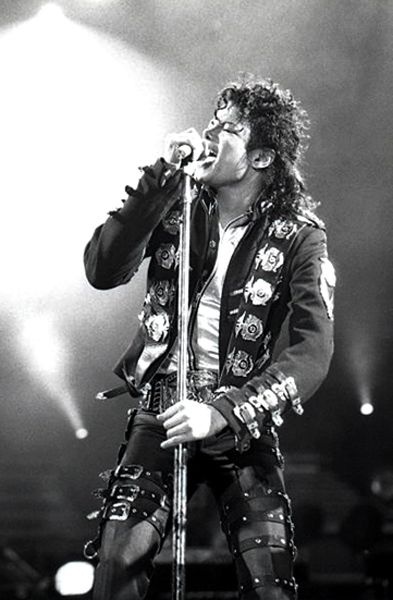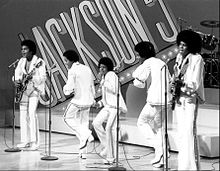
| Jackson performing in 1988, during the Bad World Tour | |
| Born | Michael Joseph Jackson August 29, 1958 Gary, Indiana, U.S. |
|---|---|
| Died | June 25, 2009 (aged 50) Los Angeles, California, U.S. |
| Cause of death | Cardiac arrest induced bypropofol and benzodiazepineintoxication |
| Resting place | Glendale, California, U.S. |
| Residence | Los Olivos, California, U.S. |
| Occupation |
|
| Religion |
|
| Spouse(s) |
|
| Children |
|
| Parent(s) | |
| Relatives | See Jackson family |
| Musical career | |
| Genres | |
| Instruments | Vocals |
| Years active | 1964–2009 |
| Labels | |
| Associated acts | The Jackson 5 |
| Signature | |
 |
|
Michael Joseph Jackson[1][2] (August 29, 1958 – June 25, 2009) was an American singer, songwriter, record producer, dancer, and actor. Called the King of Pop,[3][4][5] his contributions to music and dance, along with his publicized personal life, made him a global figure in popular culture for over four decades.
The eighth child of the Jackson family, he debuted on the professional music scene along with his elder brothers Jackie, Tito,Jermaine, and Marlon as a member of the Jackson 5 in 1964, and began his solo career in 1971. In the early 1980s, Jackson became a dominant figure in popular music. The music videos for his songs, including those of "Beat It", "Billie Jean", and "Thriller" from his 1982 album Thriller, were credited with breaking down racial barriers and with transforming the medium into an art form and promotional tool. The popularity of these videos helped to bring the then-relatively-new television channel MTV to fame. His 1987 album Bad spawned the U.S. Billboard Hot 100 number-one singles "I Just Can't Stop Loving You", "Bad", "The Way You Make Me Feel", "Man in the Mirror", and "Dirty Diana", becoming the first album to have five number-one singles on the Billboard Hot 100. With videos such as "Black or White" and "Scream", he continued to innovate the medium throughout the 1990s, as well as forging a reputation as a touring solo artist. Through stage and video performances, Jackson popularized a number of complicated dance techniques, such as the robot and the moonwalk, to which he gave the name. His distinctive sound and style has influenced numerous artists of various music genres.
Thriller is the best-selling album of all time, with estimated sales of 65 million copies worldwide. His other albums, including Off the Wall (1979), Bad, Dangerous (1991), and HIStory (1995), also rank among the world's best-selling albums. Jackson is one of the few artists to have been inducted into the Rock and Roll Hall of Fame twice. He was also inducted into the Songwriters Hall of Fame and the Dance Hall of Fame as the first and only dancer from pop and rock music. His other achievements include multiple Guinness World Records—including 13 Grammy Awards, the Grammy Legend Award, the Grammy Lifetime Achievement Award, 26 American Music Awards—more than any other artist—including the "Artist of the Century" and "Artist of the 1980s", 13 number-one singles in the United States during his solo career,—more than any other male artist in the Hot 100 era—and estimated sales of over 400 million records worldwide.[Note 1] Jackson has won hundreds of awards, making him the most awarded recording artist in the history of popular music.[6] He became the first artist in history to have a top ten single in the Billboard Hot 100 in five different decades when "Love Never Felt So Good" reached number nine on May 21, 2014.[7] Jackson traveled the world attending events honoring his humanitarianism, and, in 2000, the Guinness World Records recognized him for supporting 39 charities, more than any other entertainer.[8]
Aspects of Michael Jackson's personal life, including his changing appearance, personal relationships, and behavior, generated controversy. In the mid-1990s, he was accused of child sexual abuse, but the civil case was settled out of court for an undisclosed amount and no formal charges were brought.[9] In 2005, he was tried and acquitted of further child sexual abuse allegations and several other charges after the jury found him not guilty on all counts. While preparing for his comeback concert series titled This Is It, Jackson died of acute propofol and benzodiazepine intoxication on June 25, 2009, after suffering from cardiac arrest. The Los Angeles County Coroner ruled his death a homicide, and his personal physician, Conrad Murray, was convicted of involuntary manslaughter. Jackson's death triggered a global outpouring of grief, and a live broadcast of his public memorial service was viewed around the world.[10] Forbes currently ranks Jackson as the top-earning dead celebrity, a title held for a sixth consecutive year, with $115 million in earnings.[11]
Contents
[hide]- 1Life and career
- 1.11958–75: Early life and the Jackson 5
- 1.21975–81: Move to Epic and Off the Wall
- 1.31982–83: Thriller and Motown 25: Yesterday, Today, Forever
- 1.41984–85: Pepsi, "We Are the World", and business career
- 1.51986–90: Appearance, tabloids, Bad, films, autobiography, and Neverland
- 1.61991–93: Dangerous, Heal the World Foundation, and Super Bowl XXVII
- 1.71993–94: First child sexual abuse allegations and first marriage
- 1.81995–99: HIStory, second marriage, and fatherhood
- 1.92000–03: Label dispute and Invincible
- 1.102003–05: Second child sexual abuse allegations and acquittal
- 1.112006–09: Closure of Neverland, final years, and This Is It
- 2Death and memorial
- 3Artistry
- 4Legacy and influence
- 5Honors and awards
- 6Earnings and wealth
- 7Discography
- 8Filmography
- 9Tours
- 10See also
- 11Notes
- 12References
- 13External links
Life and career
1958–75: Early life and the Jackson 5

Michael Joseph Jackson was born on August 29, 1958. He was the eighth of ten children in an African-American working-class family who lived in a two-bedroom house on Jackson Street in Gary, Indiana, an industrial city and a part of the Chicago metropolitan area.[12][13] His mother, Katherine Esther Scruse, was a devout Jehovah's Witness. She once aspired to be a country-and-western performer who played clarinet and piano, but worked part-time at Sears to help support the family.[14] His father, Joseph Walter "Joe" Jackson, a former boxer, was a steelworker at U.S. Steel. Joe also performed on guitar with a local rhythm and blues band called the Falcons to supplement the family's household income.[15] Michael grew up with three sisters (Rebbie, La Toya, and Janet) and five brothers (Jackie, Tito, Jermaine,Marlon, and Randy).[16] A sixth brother, Marlon's elder twin Brandon, died shortly after birth.[17]
Jackson had a troubled relationship with his father, Joe.[18][19] In 2003, Joe acknowledged that he regularly whipped Jackson as a boy.[20]Joe was also said to have verbally abused his son, often saying that he had a "fat nose".[21] Jackson stated that he was physically and emotionally abused during incessant rehearsals, though he credited his father's strict discipline with playing a large role in his success.[18]Speaking openly about his childhood in an interview with Oprah Winfrey, broadcast in February 1993, Jackson acknowledged that his youth had been lonely and isolating.[22] Jackson's deep dissatisfaction with his appearance, his nightmares and chronic sleep problems, his tendency to remain hyper-compliant, especially with his father, and to remain childlike throughout his adult life, are consistent with the effects of the maltreatment he endured as a young child.[23]
In an interview with Martin Bashir, later included in the 2003 broadcast of Living with Michael Jackson, Jackson acknowledged that his father hurt him when he was a child, recalling that Joseph often sat in a chair with a belt in his hand as he and his siblings rehearsed, and that "if you didn't do it the right way, he would tear you up, really get you."[24][25] Both of Jackson's parents have disagreed with the longstanding allegations of abuse, with Katherine stating that while the whippings are considered abuse today, such action was a common way to discipline children back then.[26][27][28] Jackie, Tito, Jermaine and Marlon have also said that their father is not abusive, but rather misunderstood.[29]
In 1964, Michael and Marlon joined the Jackson Brothers—a band formed by their father and which included brothers Jackie, Tito, and Jermaine—as backup musicians playing congas and tambourine.[30] In 1966, Jackson began sharing lead vocals with his older brother Jermaine, and the group's name was changed to the Jackson 5.[16] That following year, the group won a major local talent show with Jackson performing the dance to Robert Parker's 1965 hit "Barefootin'".[31] From 1966 to 1968 the band toured the Midwest, frequently performing at a string of black clubs known as the "chitlin' circuit" as the opening act for artists such as Sam & Dave, the O'Jays, Gladys Knight, and Etta James. The Jackson 5 also performed at clubs and cocktail lounges, where striptease shows and other adult acts were featured, and at local auditoriums and high school dances.[32][33] In August 1967, while touring the East coast, the group won a weekly amateur night concert at the Apollo Theater in Harlem.[34]
The Jackson 5 recorded several songs, including "Big Boy" (1968), their first single, for Steeltown Records, a Gary, Indiana, record label,[35] before signing with Motown in 1969.[16] The Jackson 5 left Gary in 1969 and relocated to the Los Angeles area, where they continued to record music for Motown.[36] The magazine Rolling Stone later described the young Michael as "a prodigy" with "overwhelming musical gifts," writing that he "quickly emerged as the main draw and lead singer."[37] The group set a chart record when its first four singles—"I Want You Back" (1969), "ABC" (1970), "The Love You Save" (1970), and "I'll Be There" (1970)—peaked at number one on the Billboard Hot 100.[16] In May 1971, the Jackson family moved into a large home on two-acre estate in Encino, California,[38] where Michael evolved from child performer into a teen idol.[39] As Jackson began to emerge as a solo performer in the early 1970s, he continued to maintain ties to the Jackson 5 and Motown. Between 1972, when his solo career began, and 1975, Michael released four solo studio albums with Motown: Got to Be There (1972), Ben (1972), Music & Me (1973), and Forever, Michael (1975).[40] "Got to Be There" and "Ben", the title tracks from his first two solo albums, both became successful singles, as did a remake of Bobby Day's "Rockin' Robin".[41]
The Jackson 5 were later described as "a cutting-edge example of black crossover artists."[42] Although the group's sales began declining in 1973, and the band members chafed under Motown's refusal to allow them creative control or input, they continued to score several top 40 hits, including the top five single "Dancing Machine" (1974), before the group left Motown in 1975.[43]
1975–81: Move to Epic and Off the Wall
In June 1975, the Jackson 5 signed with Epic Records, a subsidiary of CBS Records,[43] and renamed themselves the Jacksons. Younger brother Randy formally joined the band around this time, while Jermaine chose to stay with Motown and pursue a solo career.[44] The Jacksons continued to tour internationally, and released six more albums between 1976 and 1984. Michael, the group's lead songwriter during this time, wrote hits such as "Shake Your Body (Down to the Ground)" (1979), "This Place Hotel" (1980), and "Can You Feel It" (1980).[30] Jackson's work in film began in 1978, when he starred as the Scarecrow in The Wiz, a musical directed by Sidney Lumet that also starred Diana Ross,Nipsey Russell, and Ted Ross.[45] The film was a box-office disaster.[46] While working on the film Jackson met Quincy Jones, who was arranging the film's musical score, and Jones agreed to produce Jackson's next solo album, Off the Wall.[47] In 1979, Jackson broke his nose during a complex dance routine. His subsequent rhinoplasty was not a complete success; he complained of breathing difficulties that would affect his career. He was referred to Dr. Steven Hoefflin, who performed Jackson's second rhinoplasty and subsequent operations.[48]
Off the Wall (1979), which Jones and Jackson co-produced, established Jackson as a solo performer. The album helped Jackson transition from the "bubblegum pop" of his youth to the more complex sounds he would create as an adult.[39] Songwriters for the album included Jackson, Rod Temperton, Stevie Wonder, and Paul McCartney. Off the Wall was the first solo album to generate four top 10 hits in the United States: "Off the Wall", "She's Out of My Life", and the chart-topping singles "Don't Stop 'Til You Get Enough" and "Rock with You".[49][50] The album reached number three on the Billboard 200 and eventually sold over 20 million copies worldwide.[51] In 1980, Jackson won three awards at the American Music Awards for his solo efforts: Favorite Soul/R&B Album, Favorite Soul/R&B Male Artist, and Favorite Soul/R&B Single for "Don't Stop 'Til You Get Enough".[52][53] He also won Billboard Year-End awards for Top Black Artist and Top Black Album, and a Grammy Award for Best Male R&B Vocal Performance for 1979 with "Don't Stop 'Til You Get Enough".[54] In 1981 Jackson was the American Music Awards winner for Favorite Soul/R&B Album and Favorite Soul/R&B Male Artist.[55] Despite its commercial success, Jackson felt Off the Wall should have made a much bigger impact, and was determined to exceed expectations with his next release.[56] In 1980, he secured the highest royalty rate in the music industry: 37 percent of wholesale album profit.[57]
1982–83: Thriller and Motown 25: Yesterday, Today, Forever
In 1982, Jackson combined his interests in songwriting and film when he contributed the song "Someone in the Dark" to the storybook for the film E.T. the Extra-Terrestrial. The song, with Quincy Jones as its producer, won a Grammy for Best Recording for Children for 1983.[58] Even more success came after the release of Thriller in late 1982. The album earned Jackson seven more Grammys[58] and eight American Music Awards, including the Award of Merit, the youngest artist to win it.[59]
Thriller was the best-selling album worldwide in 1983.[60][61] It became the best-selling album of all time in the United States,[62] and the best-selling album of all time worldwide, selling an estimated 65 million copies.[63] The album topped the Billboard 200 chart for 37 weeks and was in the top 10 of the 200 for 80 consecutive weeks. It was the first album to have seven Billboard Hot 100 top 10 singles, including "Billie Jean", "Beat It", and "Wanna Be Startin' Somethin'".[64] In March 2009 Thriller was certified for 29 million shipments by the RIAA,[65] giving it Double Diamond status in the United States. Thriller won Jackson and Quincy Jones the Grammy award for Producer of the Year (Non-Classical) for 1983. It also won Album of the Year, with Jackson as the album's artist and Jones as its co-producer, and a Best Pop Vocal Performance, Male, award for Jackson. "Beat It" won Record of the Year, with Jackson as artist and Jones as co-producer, and a Best Rock Vocal Performance, Male, award for Jackson. "Billie Jean" won Jackson two Grammy awards, Best R&B Song, with Jackson as its songwriter, and Best R&B Vocal Performance, Male, as its artist.[58] Thriller also won another Grammy for Best Engineered Recording – Non Classical in 1984, awarding Bruce Swedien for his work on the album.[66] The AMA Awards for 1984 provided Jackson with an Award of Merit and AMAs for Favorite Male Artist, Soul/R&B, and Favorite Male Artist, Pop/Rock. "Beat It" won Jackson AMAs for Favorite Video, Soul/R&B, Favorite Video, Pop/Rock, and Favorite Single, Pop/Rock. Thriller won him AMAs for Favorite Album, Soul/R&B, and Favorite Album, Pop/Rock.[59][67]
In addition to the award-winning album, Jackson released "Thriller", a fourteen-minute music video short directed by John Landis, in 1983.[68] It "defined music videos and broke racial barriers" on the Music Television Channel (MTV), a fledgling entertainment television channel at the time.[39] In December 2009, the Library of Congress selected the music video for "Thriller" for inclusion in the National Film Registry. It was one of twenty-five films named that year as "works of enduring importance to American culture" that would be "preserved for all time."[69][70] The zombie-themed "Thriller" is the first and, as of 2009, the only music video to be inducted into the registry.[68][70][71]
Jackson's attorney John Branca noted that Jackson had the highest royalty rate in the music industry at that point: approximately $2 for every album sold. He was also making record-breaking profits from sales of his recordings. The videocassette of the documentary The Making of Michael Jackson's Thriller sold over 350,000 copies in a few months. The era saw the arrival of novelties like dolls modeled after Michael Jackson, which appeared in stores in May 1984 at a price of $12.[72] Biographer J. Randy Taraborrelli writes that, "Thriller stopped selling like a leisure item—like a magazine, a toy, tickets to a hit movie—and started selling like a household staple."[73] In 1985, The Making of Michael Jackson's Thriller won a Grammy for Best Music Video, Longform.[58] Time described Jackson's influence at that point as "Star of records, radio, rock video. A one-man rescue team for the music business. A songwriter who sets the beat for a decade. A dancer with the fanciest feet on the street. A singer who cuts across all boundaries of taste and style and color too".[72] The New York Times wrote that, "in the world of pop music, there is Michael Jackson and there is everybody else".[74]
A defining point in Jackson's career took place on March 25, 1983, when he reunited with his brothers for a legendary live performance, which was taped at the Pasadena Civic Auditorium, for Motown 25: Yesterday, Today, Forever, an NBC television special. The show aired on May 16, 1983, to an estimated audience of 47 million viewers, and featured the Jacksons and other Motown stars.[75] The show is best remembered for Jackson's solo performance of "Billie Jean", which earned Jackson his first Emmy nomination.[76]Wearing a distinctive black-sequined jacket and a golf glove decorated with rhinestones, he debuted his signature dance move, the moonwalk, which former Soul Train dancer and Shalamar member Jeffrey Daniel had taught him three years earlier.[77] Jackson originally turned down the invitation to perform at the show, believing he had been doing too much television at the time; however at the request of Berry Gordy, Jackson relented and agreed to perform at the show in exchange for time to do a solo performance.[78]According to Rolling Stone reporter Mikal Gilmore, "There are times when you know you are hearing or seeing something extraordinary...that came that night."[39] Jackson's performance drew comparisons to Elvis Presley's and the Beatles' appearances on The Ed Sullivan Show.[79] Anna Kisselgoff of The New York Times later wrote, "The moonwalk that he made famous is an apt metaphor for his dance style. How does he do it? As a technician, he is a great illusionist, a genuine mime. His ability to keep one leg straight as he glides while the other bends and seems to walk requires perfect timing."[80] Berry Gordy said of the performance, "from the first beat of Billie Jean, I was mesmerized, and when he did his iconic moonwalk, I was shocked, it was magic, Michael Jackson went into orbit, and never came down."[81]
1984–85: Pepsi, "We Are the World", and business career
By the mid-1980s, Jackson's award-winning musical career contributed to his commercial appeal, which proved to be substantial. In November 1983 he, along with his brothers, partnered with PepsiCo in a $5 million promotional deal that broke advertising industry records for a celebrity endorsement. The first Pepsi campaign, which ran in the United States from 1983 to 1984 and launched its "New Generation" theme, included advertising, tour sponsorship, public relations events, and in-store displays. Jackson, who was actively involved in creating the iconic Pepsi advertisement, suggested using his song, "Billie Jean", as its musical jingle with a revised chorus.[82] According a Billboard report in 2009, Brian J. Murphy, executive VP of branded management at TBA Global, commented, "You couldn't separate the tour from the endorsement from the licensing of the music, and then the integration of the music into the Pepsi fabric."[82]
On January 27, 1984, Michael and other members of the Jacksons filmed a Pepsi Cola commercial that was overseen by executive Phil Dusenberry,[83] a BBDO ad agency executive, and Alan Pottasch, Pepsi's Worldwide Creative Director, at the Shrine Auditorium in Los Angeles. In front of a full house of fans during a simulated concert, pyrotechnics accidentally set Jackson's hair on fire, causing second-degree burns to his scalp. Jackson underwent treatment to hide the scars on his scalp, and had his thirdrhinoplasty shortly thereafter.[48] Pepsi settled out of court, and Jackson donated his $1.5 million settlement to the Brotman Medical Center in




